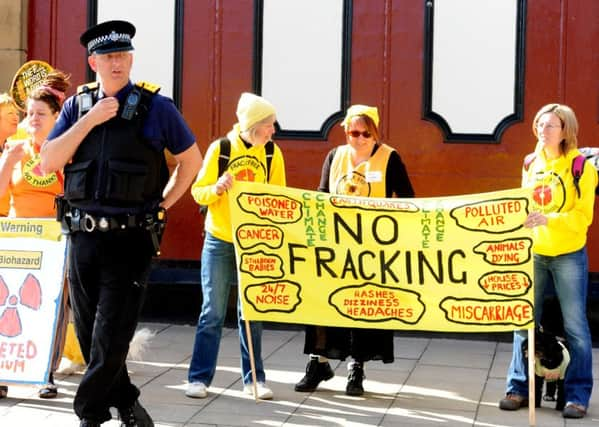Opinion: Why we fear fracking


Dr James Verdon’s recent opinion piece in the Lancashire Evening Post looks at just one of the many problems around fracking and even within that, doesn’t tell the full story.
Dr Verdon plays down the risks from earthquakes associated with fracking. But he does not address one key potential concern.
Advertisement
Hide AdAdvertisement
Hide AdThe main fracking regulator, the Environment Agency, has just consulted on whether fracking companies should be allowed to reinject their wastewater underground, rather than dispose of it via water treatment plants.
Reinjection is the standard waste disposal route in the US, where fracking has grown rapidly in recent years.
What has also grown rapidly is the number of earthquakes in places where reinjection is allowed. Before 2008, Oklahoma had an average of one earthquake a year with a magnitude of greater than 3.0. Last year they had 842. The US Geological Survey has said the main cause of the spike in numbers is the reinjection of fracking wastewater.
Clearly we can’t say with any certainty that the same would happen in the UK. But the very fact that a practice which has caused such problems in the US is even being considered in the UK is extremely worrying.
Advertisement
Hide AdAdvertisement
Hide AdUnderstandably, following the tremors in 2011, people in Lancashire are concerned about the risk of further earthquakes. But that’s in no way their only concern.
The North West Energy Task Force – funded by Cuadrilla – might try to dismiss opponents as a vocal minority, but around 11,000 people from Lancashire objected to Cuadrilla’s planning applications. One hundred and twenty four people spoke out against fracking at the recent planning inquiry, compared to just fifteen who spoke in favour.
These people are concerned about many aspects of fracking. And it’s not just them. Their concerns are echoed by experts and academics. They’re concerned about the impact of fracking on rural areas of the county. The industry tries to play this down but, in the words of US Energy Secretary Ernest Moniz, fracking “is a big industrial enterprise. That’s one thing you can’t avoid. That is something communities … have to cope with.”
They’re concerned about the health risks. Again, the industry plays these down, citing tough regulations. But last year 20 leading doctors and public health specialists signed a letter to the British Medical Journal saying that the arguments against fracking on public health grounds are overwhelming. The signatories included Dr Claire Gerada, former Chair of the Royal College of General Practitioners and Dr Sheila Adam, formerly the Government’s Deputy Chief Medical Officer.
Advertisement
Hide AdAdvertisement
Hide AdThey’re concerned about the impacts of more fossil fuels such as shale gas on climate change. Last week, the UK Government joined others in signing the agreement reached in Paris last December. This commits world leaders to strengthening efforts to cut greenhouse gas emissions. How can we try to cut emissions when we’re trying to extract more of the fossil fuels causing climate change? In the words of John Ashton, the UK’s senior climate change diplomat between 2006 and 2012 “You can be in favour of fixing the climate. Or you can be in favour of exploiting shale gas. But you can’t be in favour of both at the same time”.
And they’re angry about the prospect of the Government imposing fracking on communities that have made it clear they don’t want it.
Cuadrilla’s plans were opposed by local parish councils and by Fylde Borough Council. And of course last year they were rejected by Lancashire County Council. The Prime Minister has said that decisions on fracking “must be made by local authorities in the proper way”. But his Government has decided to make the final decision on Cuadrilla’s applications itself. This is a sure sign that the industry and its friends in Government have lost the argument on fracking.
And it’s not just Lancashire that is under threat. On May 20th, North Yorkshire County Council will decide whether to allow fracking in beautiful rural Ryedale. The plans are opposed by thousands of local residents, and by Ryedale District Council.
Advertisement
Hide AdAdvertisement
Hide AdFracking is banned or on hold in Scotland, Wales, Northern Ireland, France, Germany, Holland, Bulgaria and New York State. It’s time the UK Government listened to the opposition of local people, heeded the growing health concerns and prioritised tackling climate change rather than extracting more fossil fuels. Fracking is not the answer to our energy problems.